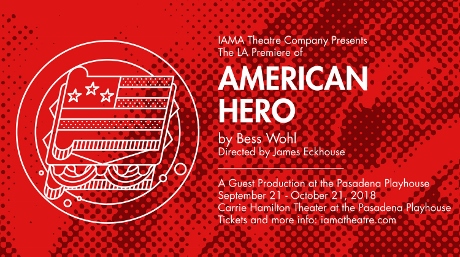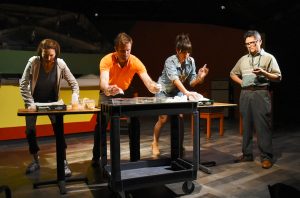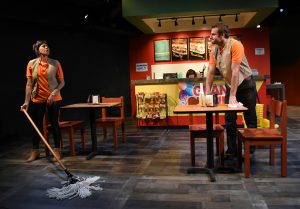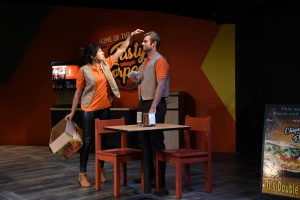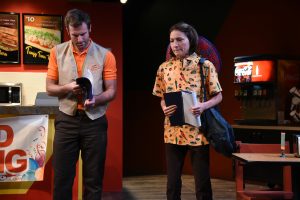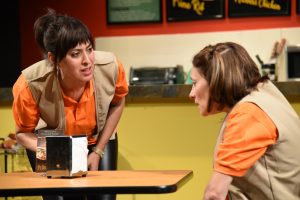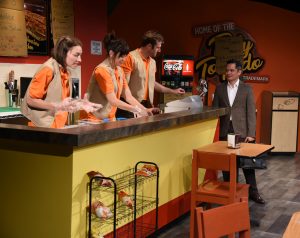FEAR THAT TASTES LIKE CHICKEN
IAMA Theatre Company’s 2018-19 season opener, Bess Wohl’s American Hero (a Pasadena Playhouse guest production at the Carrie Hamilton Theatre) is a portrait in miniature of the underemployed working poor’s quiet and not-so-quiet desperation. There is superb teamwork between the actors, and when it is at its best, the play approaches Pinteresque tragicomedy.
Three “sandwich artists” are hired by Bob, a mysterious new franchise owner and manager at a chain fast-food restaurant with a dizzying number of sandwich combinations that sound vaguely similar — all are “artisan” in name only. The trio is Sheri, a gawky young woman who works two jobs and sleeps in her car; Jamie, a single mom who substitutes sex for affection; and Ted, a middle-aged former financial exec with an MBA, now very much down on his luck.
The tone swings between surreal and naturalistic. Rodney To is perfect as Bob, underplaying a befuddled, non-specific accent and building to the character’s demented efficiency with deadpan seriousness. Bob fails to show up for the opening day of his own shop, and then after one quick visit he mysteriously disappears. The audience misses him as much as his employees, though our paychecks aren’t dependent upon him resurfacing.
Mr. To plays various other characters throughout the evening, including an absurdist take on an actual sandwich come to life. He appears in Sheri’s dream, there to “eat her fear.” She is frightened yet fascinated. “What does fear taste like?’ she asks. “Chicken,” he replies. Mr. To is terrific at embodying characters with very different ages, physical demeanors, and vocal patterns. His most unexpected turn is as a corporate representative who delivers a long, surprisingly touching aria of despair when physically threatened.
Sheri, Jamie, and Ted are the “baser,” “finisher,” and “wrapper” of the sandwich line. They itch to form friendships even as they try to stay disconnected and unencumbered by the wreckage of one another’s lives. Laura Mann, Anna LaMadrid, and Graham Outerbridge (respectively) are excellent. Ms. Mann has a striking, birdlike quality. Her fight-or-flight battle to survive is engrossing, and Mann’s physicality alternates been expansiveness and shamed containment. She is memorable and endearing.
With a fresh, non-stereotypical take on the “fiery Latina” trope, Ms. LaMadrid is droll and sexy. She sucks up to Bob when Ted complains that the required sandwich preparation speed is impossible. “Where you say impossible,” she says, eying Bob up and down with wink, “I say inspiring.” What makes the performance so effective is that LaMadrid plays the duality of the moment. Jamie is absolutely making fun of the process and using her sexuality to get points, but she is also in a bitter custody battle and needs this job. She may be taking the piss, but she is also playing for keeps.
Mr. Outerbridge is appealing and emotionally involving. Ted is still handsome and seems to have been athletic once, but he is no longer a bright young man on the rise or a capable exec. Outerbridge is patient, establishing Ted’s white bread credentials before letting his freak fly. When Ted tries to encourage Jamie with uplifting self-help psycho-religious babble, Outerbridge does a great job of starting out with bright sincerity and ending in exhausted defeat. That is when we feel how close Ted is to total collapse.
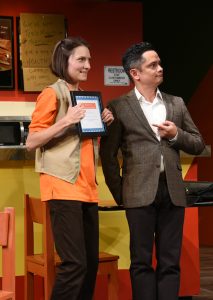 Director James Eckhouse’s staging is fantastic. He utilizes every bit of space, creating stage pictures that effortlessly flow between the play’s everchanging tones. Mr. Eckhouse makes room for the comedy without denying the characters their tragedies, yet the forward momentum and energy doesn’t flag.
Director James Eckhouse’s staging is fantastic. He utilizes every bit of space, creating stage pictures that effortlessly flow between the play’s everchanging tones. Mr. Eckhouse makes room for the comedy without denying the characters their tragedies, yet the forward momentum and energy doesn’t flag.
Ms. Wohl is a gifted playwright with a flair for telling detail. Her sharp observational skills provide the best moments of the evening. She creates memorable characters. She loves them so much herself that we can’t help but feel the same way. Yet I am not sure that I buy the logic behind some of the choices the characters make. After Bob’s disappearance, Ted’s attempt to stop Jamie or Sheri from calling the franchise corporate office seems like a plot device to create conflict rather than something he would do — especially since he is perfectly happy to call the police.
After the arrival of the corporate rep, it seems illogical that Ted and Jamie would be allowed to continue their rogue efforts, albeit for a short time. And the machinations of corporate and regional abandonment do not ring particularly true. The trouble is, these moments are written realistically. Had they more of the wacko tone of other points in the play, they might be more persuasive.
Set designer Justin Huen does wonders in a small space. When the store opens, Mr. Huen’s shop counter reveal is a delight. Music and sound designer Peter Bayne, costume designer Melissa Trn, lighting designer Josh Epstein, and props designer Michael O’Hara lend expert support to Eckhouse and Wohl’s vision.
I don’t know where Ms. Wohl is in the development process of American Hero. If this is the finished work, it is no small achievement. But I think she has more to say and more ways to say it.
photos by Dean Cechvala
American Hero
IAMA Theatre Company
Carrie Hamilton Theatre at the Pasadena Playhouse
39 S. El Molino Ave. in Pasadena
Fri and Sat at 8; Sun at 7
ends on October 21, 2018
for tickets, call 323.380.8843 or visit IAMA
